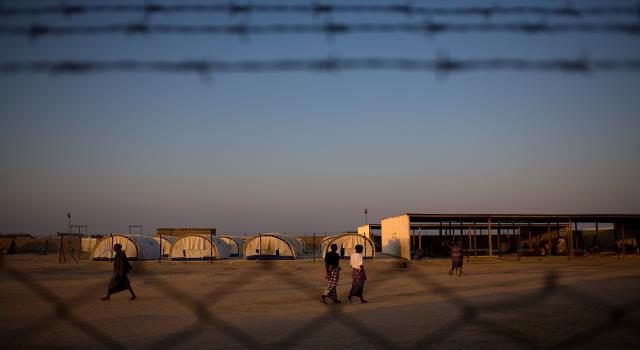Yemenis are fond of signing of the Riyadh agreement between the legitimate government and the UAE-backed separatist southern transitional council on Tuesday, amid hopes for a more stable and secure phase for their country devastated by the scourge of the Saudi-Emirati alliance war and the Houthi coup.
Despite the importance of the agreement, several complicated files are still being debated, and are now imposing themselves on the signing ceremony, amid questions about Saudi Arabia’s insistence on speeding up the signing before the outstanding issues are resolved.
The most prominent of these files relate to secret prisons, enforced disappearances, detainees held by the UAE and its agents in Aden, Lahj, Abyan, Dhali and Hadramaut, as well as prisons in Africa that follow the UAE military bases.
These files have become a dilemma, given that Abu Dhabi is evading detection of these prisons inside and outside Yemen.
The issue of forcibly disappeared and detained in the UAE is also highlighted, as it refuses to hand over all information about them to the legitimate authorities represented by the legitimate government and its security and military apparatus, to expedite the trial of those involved in terrorist cases or otherwise, and to release those who have not been convicted after their trial.
The UAE regime is trying to evade this issue and hand it over to the Saudis, because they fear the repercussions of exposing violations in this file, especially those related to human rights.
International human rights organizations have previously criticized legitimacy and Saudi Arabia, accepted by the UAE and its agents accused of involvement in abuses. Legitimacy seeks to close this file quickly, for fear of being prosecuted, especially in light of the continued questioning by international human rights organizations on the file.
In the meantime, Yemeni political sources confirmed that there is a third file pending, concerning the participants in the events witnessed in Aden and other governorates and regions in southern Yemen between the legitimate government and the UAE and its agents, during and after the recent coup in the interim capital.
Discussions are still going on sharply between the Saudis, Emiratis and Shariah about the matter, especially since there are attempts from Riyadh and Abu Dhabi to remove all participants in these recent events, and to equate UAE agents with legitimacy officials, by punishing the coup and the coup.
This is the core of the differences that delay the resolution of this issue, especially as the government seeks to reject this way of dealing with this file.
The sources said that the two most prominent figures in the legitimacy defended the state, and stood against the coup carried out by the UAE and its agents, Transport Minister Saleh al-Jubani, and Deputy Prime Minister and Interior Minister Ahmed al-Maisari.
Because the file has not yet been resolved, the fate of these two officials is still unknown as to whether they will continue in the next government or not, along with the governors of Socotra and Shabwa, military and security leaders, tribal and political figures who stood with legitimacy against the UAE coup.
The sources said that al-Jabwani and al-Maysari have become more popular and influential today, and enjoy the support of all those who reject the coups in Sanaa and Aden. They also have more word and influence in the street than the legitimacy and coalition leadership, and targeting or deporting them has serious repercussions.
Their removal may also affect any official who comes after them in the event of a new coup and decides to confront them. Thus, there are concerns among the legitimacy that the UAE’s attempts to remove these faces under Saudi pressure may be motivated by a clear intention to stop the influence of these officials if there is a new coup attempt from within legitimacy.
Preparations for the return of the Yemeni government began in Aden, as maintenance of the city’s airport began, to be fully open day and night. Government headquarters and the presidential palace are also being rearranged.
The entire government is due to return to Aden and the ban on all officials who have been banned from the temporary capital because of the UAE and its proxies for four years has been lifted. The sources pointed out that the return of President Abd Rabbo Mansour Hadi to Aden is also close, but said that the date has not yet been determined.
In the meantime, adviser to the Yemeni Minister of Information Mukhtar al-Rahbi that the Yemeni government intends in the coming period to pursue the UAE internationally; because of what he called “crimes and violations committed by the UAE or through forces loyal to it in the country.”
Al-Rahbi said in statements that the files of violations by the UAE “officers oversee torture, and the establishment of secret prisons, and the bombing of the Yemeni army forces,” among other files.
He explained that these “crimes are documented and will activate these files in international forums,” noting that the government is interested in this matter greatly.
He added: “Even if the government does not act officially there are local and international organizations will move in the courts and international organizations, and will expose these crimes.”
Recent calls for the international prosecution of the UAE have escalated because of what it calls “crimes in Yemen,” and has launched online campaigns demanding swift action to detect and prosecute those crimes.
UN reports of rape in Yemen carried out by UAE-backed forces in secret detention centers have been documented, and parties to the conflict, including the Saudi-UAE alliance, may have been involved in war crimes and violations of international law.
A UN report on monitoring human rights violations in Yemen last August revealed details of international crimes committed by the UAE, and highlighted broadly human rights violations.




